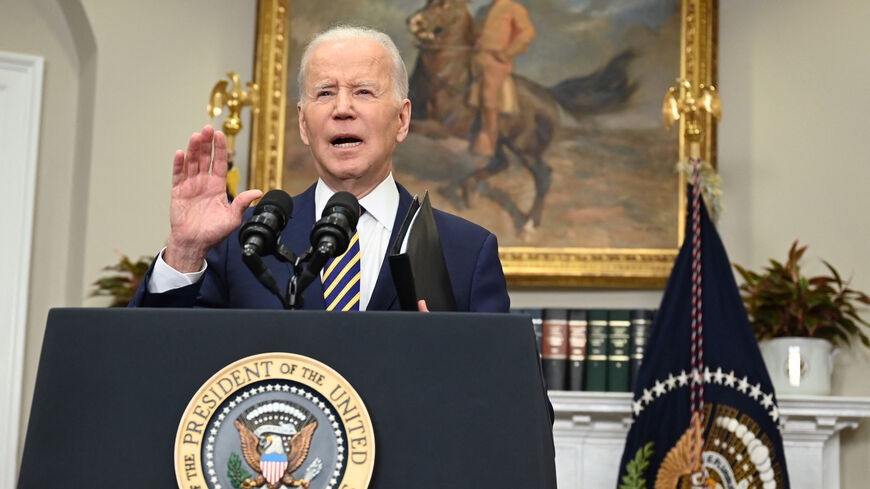President Joe Biden announced a ban on Russian oil and gas imports into the United States Tuesday as his administration tightens its squeeze on Russia’s economy over its invasion of Ukraine.
“Today, I am announcing the United States is targeting the main artery of Russia’s economy,” Biden said in televised remarks from the White House.
“Russian oil will no longer be acceptable at US ports and the American people will deal another powerful blow to [President Vladimir] Putin’s war machine,” Biden said.
Since Russia’s Feb. 24 invasion, gasoline prices in the United States have surged to their highest levels since 2008, topping $4 per gallon.
The White House says it's seeking ways to shield Americans from rising fuel costs. Last month, senior administration officials Brett McGurk and Amos Hochstein traveled to Saudi Arabia for discussions that covered energy security.
Why it matters: A deal to revive the Joint Comprehensive Plan of Action could help offset the Russian embargo by returning more than 1 million barrels of Iranian oil to global markets.
Vali Nasr, a professor of International Affairs and Middle East Studies at Johns Hopkins University, said Iran's potential production could in the short term help reduce the anxiety that is rattling investors.
"Not all of [Iran's oil] will flow tomorrow morning, but it can ease a lot of the speculative tension that is pushing prices up," Nasr said.
But even if a deal is struck to lift tough sanctions on Iran’s oil sector, analysts caution it could be several months before Iran is deemed in compliance with its nuclear obligations and is able to ramp up its output.
Asked Monday about indirect talks with Iran, White House Press Secretary Jen Psaki said oil was part of the discussions, “but the most important reason is to prevent them from acquiring a nuclear weapon.”
Talks hit a snag over the weekend after Moscow demanded the multilateral accord include a guarantee that Western sanctions imposed over its Ukraine invasion won’t harm future Russian trade with Iran.
US officials have dismissed Russia’s eleventh-hour call for a guarantee. Secretary of State Antony Blinken said Sunday that Ukraine-related sanctions on Russia have “nothing to do” with the Iranian nuclear agreement.
Barbara Slavin, the director of the Future of Iran Initiative and a nonresident senior fellow at the Atlantic Council, says it’s unlikely the nuclear talks will be derailed over Russia’s latest demand.
“It’s a last-minute gesture and … ultimately it will be resolved because I don’t think it’s in Russia’s interest for this to fall apart,” Slavin said. “They’re already a pariah state. Do they really want to show that they’re not a responsible actor on any front anymore?”
What’s next: Top Iranian negotiator Ali Bagheri Kani abruptly left the Austrian capital Monday night for consultations in Tehran. The European Union’s envoy at the talks, Enrique Mora, tweeted that technical discussions are finished and that “political decisions” will be made in the coming days.
Meanwhile, the Iranian new year, or Nowruz, is fast approaching. Slavin says if a deal isn’t reached before the March 21 holiday, “that would mean we have serious problems in terms of getting this restored.”
Know more: Our Week in Review takes a look at congressional opposition to a deal and whether a possible prisoner exchange could dampen the political blowback.







